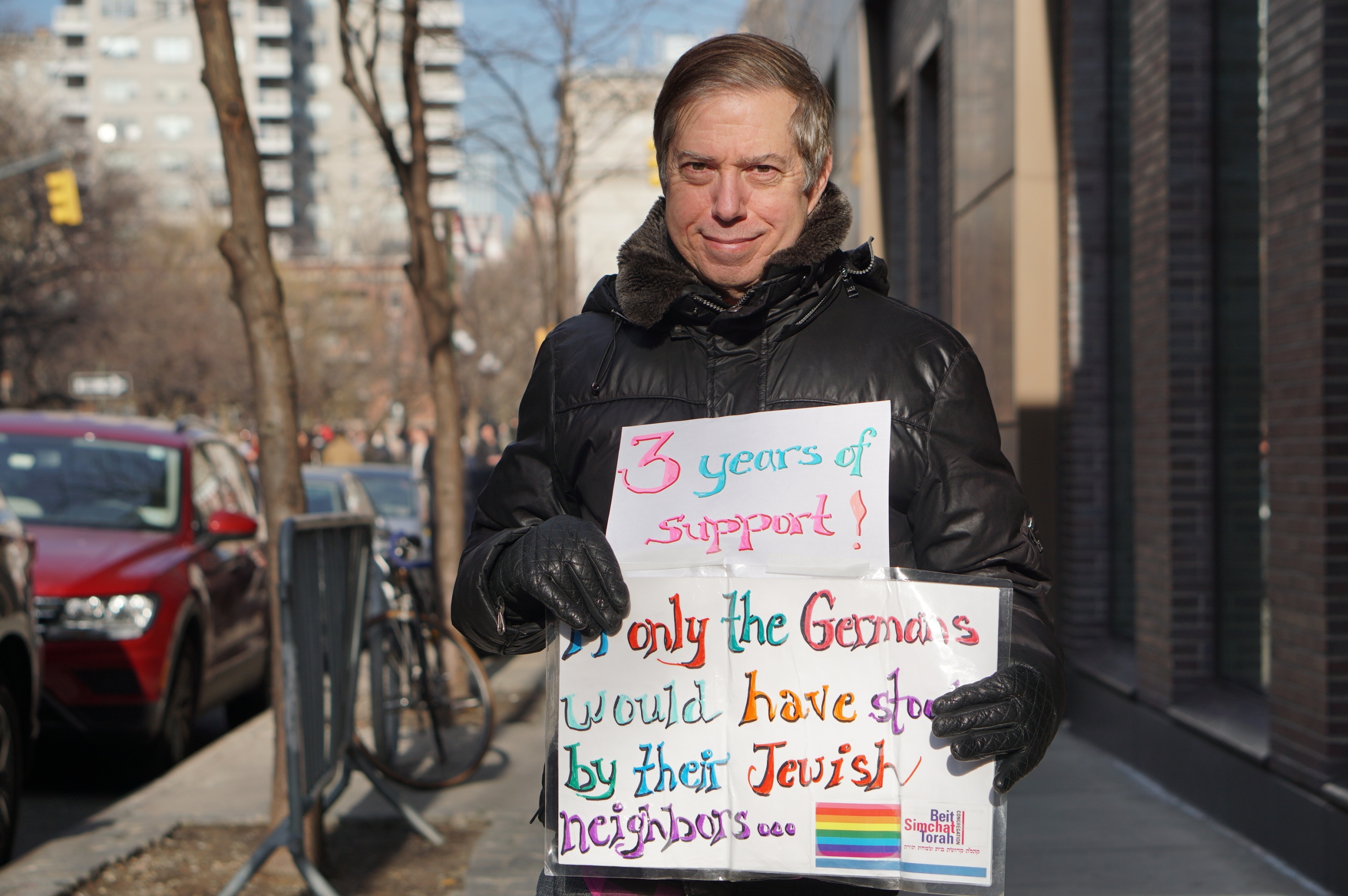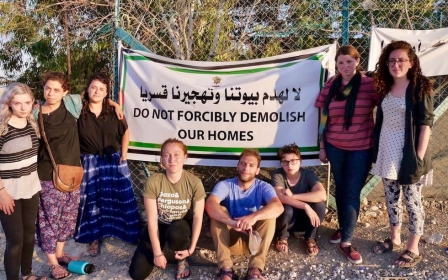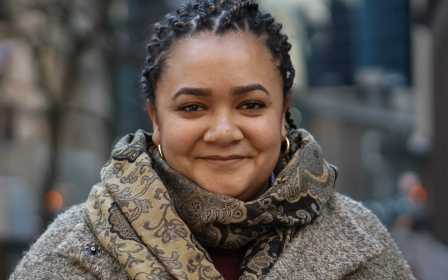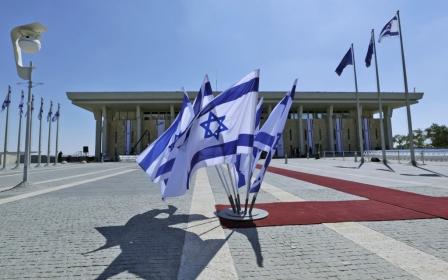The Jewish New Yorkers standing in solidarity with their Muslim neighbours

It began the Friday after Donald Trump was inaugurated.
Disturbed by the rhetoric of the new US president, who promised to ban Muslims from the country, four members of the Congregation Beit Simchat Torah (CBST), a Jewish organisation for the LGBTQ community in New York City, assembled outside New York University’s Islamic Centre with a simple message of friendship and solidarity.
They came to support a community vilified by the commander-in-chief. Three years on, you can find them in the same place, doing the same thing.
Whether it is a blistering summer day in July, or a freezing winter’s day in January, up to a dozen members of the CBST congregation make their way to 238 Thompson Street in Greenwich Village in Manhattan every Friday, holding up their handwritten signs, greeting Muslim worshippers coming in to pray.
"No matter how cold it is, or however hot it might be, they are always here. I appreciate them
-Sajid Nasir, worshipper
Carrying what he describes as his original sign from his earliest visits to the Islamic Centre, Rick Landman says the reason he continues to come is rooted in his family's history.
New MEE newsletter: Jerusalem Dispatch
Sign up to get the latest insights and analysis on Israel-Palestine, alongside Turkey Unpacked and other MEE newsletters
“Both of my parents are Jewish refugees from Germany. I said to myself that if Christians would have stood outside synagogues in the early years [of Nazi Germany] - like in the late 1920s and 1930s - maybe things would have been different,” he tells Middle East Eye.
“When people talk about Nazi Germany, they don’t remember the early days. My parents told me what it was like in the beginning. And people forget that before the Holocaust, Germany was a civilised country too,” the 68-year-old says.
“I just made it my commitment to be free during this time every Friday, and I have been here almost every week.”
The Islamic Centre of NYU is known as a religious hub for young American professionals and students living and working in the city.
Each week, hundreds of men and women make their way to the prayer room on the fourth floor of the building opposite Washington Square Park.
Arriving worshippers smile and stop to greet the small group assembled outside the building. Passerby crisscross the men and women on the sidewalk, and read the handwritten posters curiously.
Those attending Friday prayers at NYU for the first time take photos of the group's members, while regulars greet them with a tone of kinship and familiarity.
Upon hearing a greeting by Deborah Megdal, a rabbinical intern at CBST, a man entering the revolving doors of the building looks back and replies: “Bless you for being here.”
Rise of Islamophobia
Though Islamophobia in the United States predates Trump's election, multiple reports have concluded that his rise has emboldened right-wing extremists and given credence to hate crimes.
A study released by the Institute for Social Policy and Understanding last year found that negative public opinion of Muslims in the US has been on the rise since 2018.
Meanwhile, antisemitism in the US is also rising and members of the CBST say they feel vulnerable. In New York City, there has been a spike in antisemitic hate crimes.
CBST say the fledgling relations between both communities has seen members of the NYU Islamic Centre come to show their support when the Jewish community has suffered tragedies.
Susan Meyer says building relations is part of demonstrating a collective defiance against Trump’s policies.
“We have since built relationships with each other. And they often come to support us, too,” the 79-year-old New Yorker tells MEE.
Earlier this month, Trump said he would be expanding the Muslim ban that has already impacted millions of people from several Muslim-majority countries.
It is still unclear which countries would be added to the list, but activists have begun to use legal resources to oppose the move.
Since the heightening of tensions between Iran and the US following the killing of Iranian Major-General Qassem Soleimani, Iranians and Iranian Americans have faced immense discrimination and surveillance.
At least 16 Iranian students have been turned away from the US since August, despite carrying valid visas, while scores of Iranian Americans have faced harassment and detention at US ports of entry based on their background over the past three weeks alone.
NBC reported last week that US border officers working at multiple crossings with Canada were instructed to target and interrogate Iran-born travellers.
On Friday, Sajad Nasir, a regular worshipper at the mosque, stepped onto the sidewalk with a bouquet of light pink roses.
He handed them out individually, thanking each member of the cohort for being there.
“No matter how cold it is, or however hot it might be, they are always here. I appreciate them,” he says.
“And I want to show my appreciation. It is a beautiful demonstration of how to be there for another community.
“Sometimes, you just have to show up,” he said.
Middle East Eye delivers independent and unrivalled coverage and analysis of the Middle East, North Africa and beyond. To learn more about republishing this content and the associated fees, please fill out this form. More about MEE can be found here.


![[Azad Essa/MEE]](/sites/default/files/rick_and_co.jpg)
![There has been a spike in anti-Semitism in the US under Trump's presidency [Azad Essa/MEE]](/sites/default/files/nyc_islamic_centre.jpg)


